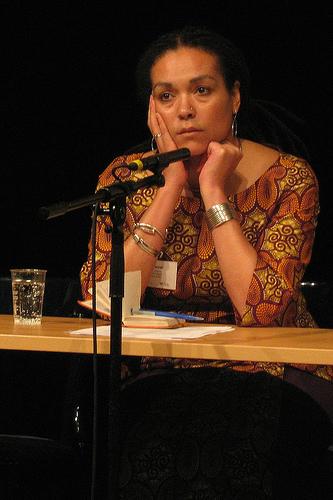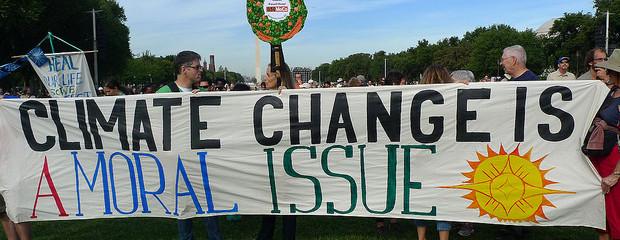INTERVIEW – Muthoni Wanyeki: “In Kenya, this is not a time when moderates are carrying the day.”

Muthoni Wanyeki is former Executive Director of the Kenya Human Rights Commission (KHRC). We met in London to discuss the current environment for civil society and human rights organisations in Kenya.
We began by discussing current UK policy towards Kenya and, in particular, the issue of diplomatic relations with a government that is headed by a pair of ICC-indictees. For more on this see our recent article “˜Kenya: an illiberal backslide in the era of the ICC’.
MW: Muthoni Wanyeki
MT: Magnus Taylor – Editor, African Arguments
***
MW: They [the UK] have no clue – as far as [they’re] concerned it’s a legitimate government. But they’re playing it wrong. Instead of being all apologetic they should just state that “˜this is our position.’
In a study of strategy, the Kenyan government, such as it, has been brilliant – they go super on-the-offensive and no one knows what to do. But, truth be told, Kenyans are very pragmatic – they are not going to start targeting UK businesses. There are too many Kenyans who work in them and depend on them.
MT: What should the UK’s “˜Red Lines’ as regards our relationship with the Kenyatta administration be?
MW: They [the UK] have already said this – [it’s] non-compliance with the ICC, but they [the UK] are looking for a way out.
MT: What sort of levers do “˜we’ [the UK] have over Kenya?
MW: The UK needs to continue to state its position categorically. I don’t think there’s any real risk of anything happening – too many Kenyans are invested in the British presence. There’s no need to bring out “˜big Sticks’ until they [the indictees] stop cooperating.
MT: What is the atmosphere in Kenya currently like – particularly for those people who work in the civil society/human rights world?
MW: The atmosphere [in Kenya] has been bad since the election. The Supreme Court judgment was devastating. I worked on the petition and can report the Supreme Court did not even engage with some of our evidence…we had an observer in the judicial scrutiny, which gave a lot more evidence than actually went into its formal report…we wanted to raise that the final morning, but the lawyer said that we had enough without it – we agreed at the time, but now wish that we hadn’t listened to her. At least we’d have it on record.
MT: And what effect did the Supreme Court judgement have on people working in the human rights sector?
MW: It [The Supreme Court judgement] called into question everything we’d worked on for five years: what didn’t we do in terms of electoral reform? What didn’t we push for? What didn’t we do in terms of judicial reform?
The judgement demobilised people in the human rights community and made all the work we do seem pointless. It has also deeply divided the country – half of the country is deeply angry, the other half is “˜jubilant’.
MT: Why do people on the winning side feel so “˜jubilant?’
MW: There’s work to be done on the motivations of the winning supporters…but there may be some legitimate concerns among members of the Kikuyu community (which I belong to): some people thought this [voting for Jubilee] was what would keep them safe.
Middle class Gikuyus believe those “˜false narratives’ that have developed – “˜we suffered most under colonialism, we fought most for independence, we are blamed most for the country’s uneven development. And all we do is work hard’…as though other people didn’t suffer, didn’t fight, as though systemic discrimination doesn’t exist and as though other people don’t work hard.
They have the feeling that they made a huge mistake in handing over power to somebody else in the Moi regime – they suffered for it – many Gikuyus talk like they went through a genocide during this period. They think “˜we’re back and we’re not moving, and why should we…if people want to have what we have then they should work harder.’
MT: And what is the reaction to people like you who try to counter this narrative?
MW: People like me are seen as traitors to the Gikuyu community. The kindly view is that we are “˜misguided.’
MT: What are your views on the repressive legislation recently tabled? For example, the Media and Communications Bill and Public Benefits Organisations Act.
MW: On the Media and Communications Bill, the media has fought back and media ownership is quite in bed with “˜the Jubilants’ anyway.
Anti-civil society legislation may actually go through – it’s in the Jubilant Manifesto – they’ve had a problem with civil society for a long time anyway; particularly since the names were released of who was going to be charged by the ICC.
MT: What impact would the anti-civil society legislation have on the operational capacity of these organisations?
MW: In civil society as a whole, 81 per cent of organisations get their budget from membership fees. But human rights organisations, which do not, would be devastated. This legislation has therefore been carefully drafted to target these kinds of organisations: it would finish them. They would not be able to operate.
Some committed people would carry on, but the institutional foundations would go.
MT: What is happening at a local level – beyond Nairobi?
MW: The greatest danger is at the community level. The Human Rights Protection Chain was part run by the KHRC and in my experience it was always the local community workers who were in and out of it.
Generally, when there’s activity at the ICC, risk to community-based people goes up (particularly in the Rift Valley) – the threat is generally directed by local politicians and security officials, but via relatives and community members.
Usually an offer is made first which is not coercive and if that is refused then action becomes threatening.
MT: Is this coercive action top down or bottom up?
MW: A little of both – it is politically inspired, but there is both individual and collective agency there too. I see it getting worse before it gets better.
MT: What would need to happen for things to get better?
MW: For things to get better we would need a new government. There is nothing going on in government right now but the ICC…there is a big “˜eating’ frenzy, everyone is under surveillance and on standby.
MT: Does anyone in government differ to the current position on the ICC?
MW: Probably, but what can they do? These are not stupid people and I think people are beginning to realise [that it’s not doing the country any good] – the last poll showed that 67 percent of Kenyans want Kenyatta to attend his trial and 51 per cent actually support the continuation of the trials at the ICC.
People seem to be starting to think: “˜You [Kenyatta] told us that this was a personal problem, so if it was, then just deal with it and go [to the Hague]’.
It’s not just Kenyatta either – he’s working with a team of very bellicose and belligerent people. There are a lot of hardliners there who believe that it would be a sign of weakness for him to even appear.
This is not a time when moderates are carrying the day.
For more on Kenya click here







[…] From African Arguments: https://africanarguments.org/2013/11/26/interview-muthoni-wanyeki-in-kenya-th is-is-not-a-time-when-m… […]
Muthoni is a sore loser. The Supreme Court ruling in the election petition against the Presidential Election results in Kenya was very fair and was correct. Actually the atmosphere in Kenya is very good since the election petition and we are all better off that the losing side did not get anywhere near state power
I’m surprised that one can talk about ‘the losing side’. the only losing side in such a polarised state as kenya is at the moment is Kenya itself. The best brains leaving because they will not be awarded jobs if they are the ‘wrong’ tribe (and enriching other nations instead) resentment simmering underneath that ‘accept and move on’ mantra, that will one day soon find the spark to light it afresh. And now, the ‘personal matter’ that has become a state matter and everything else takes second place. Losing side?!!! No, there is no medicine to what ails us, apart from serious introspection and a conscious break with the tribalistic, corrupt, kleptocratic past. Otherwise those who are smug about ‘their Kenya’ today will wake up too late, when that Kenya has shrunk all around them and left them behind. We are all losers if we are a divided country and an absence of violence does not mean the country is at peace.